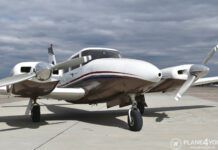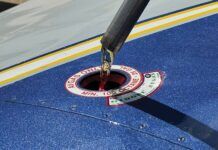Aviation has never lacked for dumb ideas. It’s what drives innovation.
“Hey, Orville, wanna jump off a sand dune strapped to these really cool wings I made in the bike shop?” What seemed stupid in 1903 is recognized as pioneering genius today. Likewise, countless other notions such as flying inside clouds without reference to the ground seemed impossible at first. But, in 1929, aviation hero and guy who’s smarter than anyone writing this piece, Jimmy Doolittle, proved that humans could survive flight solely on the gauges. Implicit was that it’s really stupid to try IMC without instrument flight savvy. VFR humans, though, routinely test this concept with predictable results.
In 1965, when my father took me to see Those Magnificent Men In Their Flying Machines, I laughed at the newsreel footage of ridiculous early aircraft crashing in time to vaudevillian music stings. Great stuff. I knew I had to become a pilot, preferably in something that didn’t crash. And, mostly, I’ve succeeded, thanks to better aircraft design and buckets of dumb luck. After 45 years of exploring the frontiers of my personal idiocy in flight, I’ve earned the position of airport old guy, certificated to grouse about the failings of others.
For instance: Twenty years ago, I was an air traffic controller. Sweet gig, that. The FAA paid me to sit inside an air-conditioned glass box watching airplanes fly and witness more than a few crashes, usually with non-fatal, head-scratching results. Chief among the inevitable prangs were the pilots with the focus of suicide bombers and little grasp of the gentle art of the flare on landing.
These pioneers of failure were determined to prove that Cherokee 140s can land safely after twice bouncing. Only, they can’t. You get two free tries, but on the third attempt to plant the accident arrival unit (AAU), something will break. Seen it too many times and not just by Cherokee riders. Remedial training might limit recidivism, but I doubt it. In close competition is loss of directional control—meaning feetless pilots have no idea how to handle crosswinds—which keeps repair shops in business, and there’s no cure for this malady, either. Sorry, I’m jaded.
There’s another realm of aviation silliness that first came to my attention as an air traffic controller, and that’s the weird things we say on frequency. Most instrument pilots—at least the ones who read IFR magazine—sound cool on the air. They know that key to good communications is to not key the microphone. What you don’t say is more valuable than what could be said before the brain’s engaged. The yakkitive pilot who tries to dominate an ATC frequency with “ahs” and “ums” or the stinky transmission starter, “And,” as in “And … Cirrus Eight Niner Blah Blah is with you at …” No, you’re not “with” the controller. She’s miles away flipping off your target on the radar display, because you’re clogging the frequency. Experienced controllers know how to nip excessive verbiage in the larval stage, but there’s no sheriff to clean up CTAF.
CTAF means Common Traffic Advisory Frequency or Clown Talking Aviation Fest. The tonnage of verbal hijinks on these community chat frequencies is immensely annoying. Recently, I was in the pattern with a tailwheel student, while 30 miles away, two chuckleheads on 122.8 discussed their various positions like pre-teens on one of those, you know, cellphone things:
“I’m, like, over the freeway, where are you?”
“Like, over the lake.”
“OMG!”
And it devolved from there. There really should be an app that automatically silences anyone making more than two transmissions inside of 30 seconds. Granted, I don’t completely understand apps but am told they can do anything.
The mouthful of uselessness phrase, “Traffic in the area, please advise,” lingers in the aerial lexicon with the tenacity of Army-issue VD.* Can’t be killed, despite the FAA itself stating years ago in AIM 4-1-9(g) that—and I’m paraphrasing, “It’s thoroughly stupid! Don’t say it … ever!” And yet, it slips into the CTAF conversation, much like your Uncle Jake who brings up his colonoscopy at family reunions.
Here’s the latest entry into the Creative Earsore category and it may be new to some of you. “Last call.” As in the Twin Cessna pilot who announced his every intention from, “Taxiing from the ramp to runway one-five …” to “Taking runway one-five …” then, “Taking off runway one-five (and, of course adding, “Traffic in the area, please advise”). The play-by-play continued with several updates on his altitude, headings and SAT scores. Closing this CTAF-blocking podcast was the phrase, “Clear to the north. Last call.” Full disclosure: I used to be a bartender—a really bad one—and last call meant, “Hey, rummies, it’s 2 a.m., lift your faces off the bar and order one for the road.” Sorry if that toys with your sitcom image of Cheers-like bartenders.
Who cares if this is your last call? Unless, of, course, you’re announcing that you’ll never speak on CTAF again. In which case, you’re welcome back anytime. Thinking I was alone in my pique from this newfound phraseology, I was surprised when a designated pilot examiner contacted me to ask, “Have you been hearing ‘last call’ reports on CTAF?” And, like two old granddads who can’t understand why kids nowadays listen to rap, we vowed to give these last call offenders stern looks whenever we heard it.
Yeah, that might be a dumb idea, but there’s a linguistic moral imperative in play here best expressed in the cinema classic, Animal House: “This situation absolutely requires a really futile and stupid gesture on somebody’s part,” and we who are without fault are just the ones to do it. So, wherever there’s a pilot beatin’ up a CTAF or confusing “hanger” with “hangar,” I’ll be there, muttering to myself in righteous superiority while refusing to advise when requested to do so.
Who’s with me?
Anyone? No … ?
Last call ….
*Long-time reader Mike Palmer writes to say that in the latest version of AC-90-66B, the FAA actually officially recommends against trolling for traffic on CTAF in section 10-3.1 “Note: Pilots are reminded that the use of the phrase, ‘ANY TRAFFIC IN THE AREA, PLEASE ADVISE,’ is not a recognized self-announce position and/or intention phrase and should not be used under any condition. Any traffic that is present at the time of your self-announcement that is capable of radio communications should reply without being prompted to do so.”
Not that anyone would possibly pay attention to it.
































